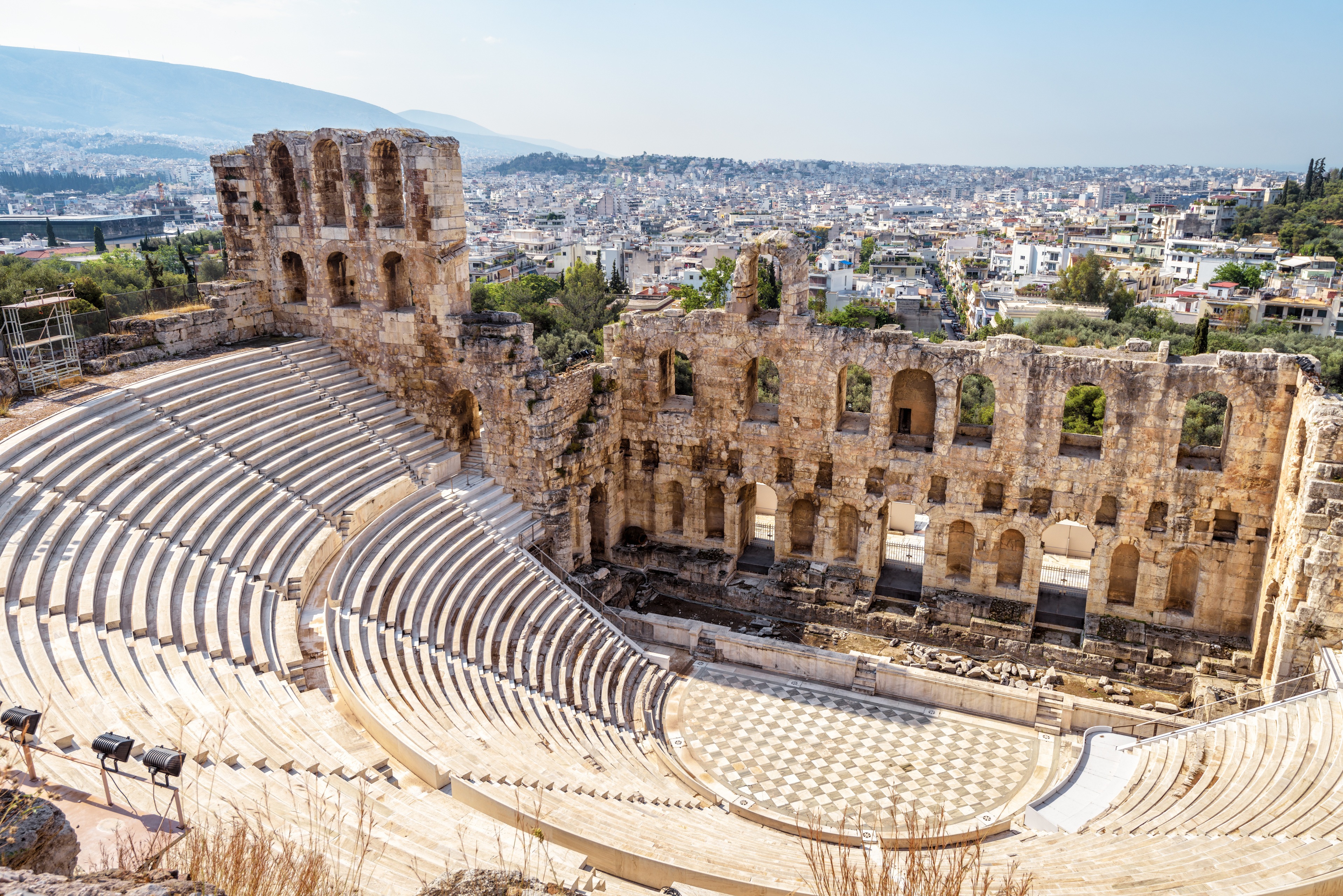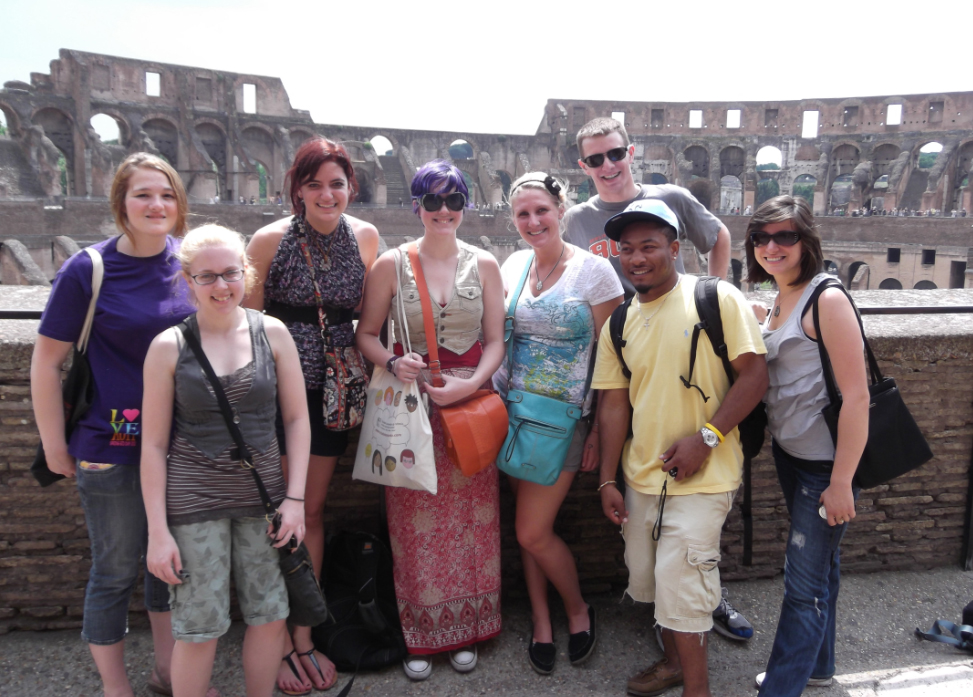Nationally recognized for student experience
The Wall Street Journal

Bachelor of Arts (B.A.)
Minor
World Languages and Cultures: Classics
The BGSU classics specialization within the world languages and cultures program is designed to acquaint you with the ancient cultures of Greece and Rome.
Modern ideas about many things – from politics to athletics, art, history, law, literature, philosophy, rhetoric and society – come from the ancient Greeks and Romans.
In addition, studying classics improves your reading and writing skills and makes you a more effective communicator.
The ancient Greeks and Romans were as concerned about the fundamental issues of life, love and death as we are today. The program introduces you to the most important areas of ancient Greece and Rome including archaeology, art, biography, history, philosophy, language and literature. The classical civilization specialization recommends, but does not require, intensive language training in ancient Latin or Greek.
BGSU also offers an undergraduate certificate in ancient languages (Greek and Latin).
Awareness through understanding
Learning about another culture makes you a more agile, flexible and powerful thinker. Learning about the many ways people from other cultures live, love, fight and die encourages you to think differently and more deeply.
Learning about the past offers you perspective. Greek and Roman thought, expressed in ancient Greek and Latin and then translated into English, permeates the modern conception of life and what it means to be human. Many of the most influential works of literature were written in Greek and Latin. The increased awareness you gain through your study of the classics enables you to gain a deeper understanding of yourself and others so that you can build your future more wisely.
Word power
A crude estimate suggests that of the 20,000 most common words in English, about half are derived from Latin, either directly or through French. And at least 2,000 words can be traced back to Greek, putting the total of English vocabulary derived from Latin and Greek at about 60%.
Moreover, at least 90% of the specialized vocabulary of the sciences derives from Greek and Latin.
Reading the Classics increases your vocabulary and gives you control of words, the basic elements of all discourse, enabling you to speak well, read well and write well.
Classics and life
BGSU offers classics as a major or minor and is the perfect preparation for the vast majority of jobs that require you to be an effective collaborator, communicator, problem-solver and thinker. It also prepares you for graduate study in ancient art and archaeology, the Classics, dentistry, history, law, medicine or philosophy.
The BGSU classical civilization major emphasizes the study of culture.
Study some of the essential areas of classical civilization, including art, history, philosophy, language and literature.
Why study classics at BGSU in Ohio?
- Highly-skilled educators. Our award-winning world language and cultures faculty leverages their wealth of scholarship, research and real-world experience to ensure each student excels.
- Study abroad. Immersion is one of the best teachers. That’s why BGSU prioritizes study abroad experiences for our students.
- On-campus resources. Our on-campus learning resources include expansive university libraries and student language clubs.
- Ample scholarship opportunities. BGSU students have so many scholarship prospects – for specific degree programs, international travel or study abroad opportunities.
- Hands-on experiences. Experiential learning is a core focus of the world languages and cultures degree program. BGSU offers service learning classes, the Global Village learning community,, field trips, research opportunities and more!
- BGSU Peace Corps Prep Program. The BGSU Peace Corps Prep Program is a 15-credit, 3-course study concentration that offers students a chance to be a part of life-changing (and resume-boosting) international outreach and aid operations.
- Next-level learning. BGSU offers advanced study in world languages and cultures with three master’s degrees: German, Spanish and European Studies. We also offer graduate certificates and part-time M.A. tracks.
- Career connections. Our impressive alumni network includes professionals at prominent universities, major corporations and elite government agencies such as the FBI.
- Get hired! Graduates of the BGSU B.A. in world languages and cultures degree program bring essential skills to the global job market. Employers across industries recognize them as stand-out workers with exceptional abilities to communicate across cultures, think critically and ethically adapt to diverse environments with social awareness.
Second language acquisition can boost salary and job prospects by as much as 35%.
– Empirica
#1 public university in Ohio for career prep
The Wall Street Journal
Career - what can you do with a classics degree?
Over the course of your working career, you are expected to hold eight to 10 different jobs. Today's employers seek to hire those who have learned transferrable skills that are fundamental to your study of classics – collaboration, communication, problem-finding and problem-solving.
Our course of study in classicals is excellent preparation for students interested in pre-law, pre-dental and pre-medical programs. It also provides the foundation for graduate work in ancient art and archaeology, ancient history, classics or philosophy.
With a classics degree, you can work in fields as diverse as the arts, business, education, environmental advocacy, government, health and social services, international relations, journalism, politics, theology and translation services.
Career paths
- Art historian
- Author
- Dentist
- Educator
- Journalist
- Lawyer
- Museum curator
- Physician
- Publisher
Quick Facts from the Bureau of Labor Statistics
Curriculum
The classics specialization culminates in a capstone seminar that asks you to apply what you have learned to solving real-world problems.
Study with our award-winning faculty who pioneer effective new techniques and innovative active learning strategies designed to help you reach a deeper level of learning.
You will have the opportunity to develop transferable skills in a range of areas.
- You will be a problem-solver and critical thinker who can analyze information, draw conclusions, see different sides of an argument and persuasively communicate.
- You will collaborate, debate and discuss, developing a greater awareness of yourself and the world, while learning to accept ambiguity, difference and diversity.
- You’ll be able to build sound arguments and conduct independent research.
Classes in the classics take an applied and experiential approach to learning. If you are unsure of your career path and wish to find your way, a classics emphasis can help you come to understand yourself in a way that is fundamentally different from what it was before. You, your knowledge, your understanding, your values, your creativity change and grow, offering you a richer life filled with choice, intention and possibility. This richness enables you to imagine a new life and many possible worlds that you can then live into existence.
Study the Greek and Latin roots of words in the Word Power course, designed for improving your communication skills and vocabulary. More than that, studying classical civilization will bring a breadth of perspective that few other disciplines can provide.
The civilizations of Ancient Greece and Rome also passed down many of the stories we know and love today. You will learn how to parse the structures underlying biography, history, mythology, and poetry.
In our advanced readings you will delve into particular writers – biographers, historians, novelists, philosophers, poets. Read about Aeneas, Achilles, the sack of Troy, Heracles’ labors, the flight of Icarus, Pygmalion and Galatea, the doomed love of Queen Dido, and Odysseus’ struggles to return home to Ithaka. Study the cultures of Egypt, Greece, and Persia with Herodotus, the Peloponnesian War with Thucydides, and the scandalous careers of the early Roman emperors with Tacitus and Suetonius. Peer through the theatrical masks of comedy and tragedy as you read the dramatic poetry of Aeschylus, Aristophanes, Euripides, Sophocles, Plautus and Seneca.
For initiation into the mysteries behind teaching the classics, take our Apprentice Teaching course.

Sample courses
- Ancient Greek
- Ancient Historians
- Women in Ancient Greece and Rome
- Word Power
- Norse Myth
- Ancient Drama
- Latin
- Wizards, Warriors and Witches
#1 university in Ohio – big or small, public or private – students would choose again
The Wall Street Journal
Study Abroad
Observing the preserved ruins of classical Greek or Roman civilization during a study abroad experience brings classical civilizations to life in a way that is hard to explain.
BGSU offers classic civilization students an opportunity to study in Greece and Italy. Classes in Italy are conducted at the Centro Linguistico Italiano Dante Alighieri (CLIDA) in Italy’s capital city of Rome.
CLI Dante Alighieri is located on the Piazza Bologna. The location is convenient to the historical center of Rome, a lively and cosmopolitan metropolis of 3.8 million people and a center of culture famous throughout the world for the beauty of its art and monuments.
The world languages and cultures program with a specialization in classics is a part of the Department Of World Languages and Cultures and the College of Arts and Sciences.
Accreditation
Bowling Green State University [BGSU] is accredited by the Higher Learning Commission. BGSU has been accredited by the Higher Learning Commission since 01/01/1916. The most recent reaffirmation of accreditation was received in 2022-2023, with our next reaffirmation of accreditation scheduled for 2032-2033. Questions should be directed to the Office of Institutional Effectiveness.
Request Information
Updated: 12/04/2025 10:26AM

